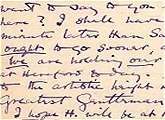Irish Melodies

Photograph by Martyn Boyd, courtesy Queen's University
Belfast
Special Collections at Queen's University Belfast Library houses many noteworthy collections of texts and manuscripts, spanning across numerous fields of study and providing significant sources for research. Three of the library's major eighteenth-century collections, namely the Thomas Percy and Edward Bunting collections, with related collections, are highlighted on the Archives Hub this month, with links to related websites.
The Irish poet, satirist, composer, and musician Thomas Moore (1779-1852) drew much inspiration from the melodies collected by Edward Bunting (1773-1843), a collector of Irish folk songs, and by Bishop Thomas Percy (1729-1811), an author, poet and antiquarian.
The almost intact eighteenth-century library of Thomas Percy features monographs, bound volumes of pamphlets and manuscripts relating to English Literature, Gaelic and northern poetry and antiquities, and popular metrical and prose romances of Europe. The presence of works by authors such as Oliver Goldsmith, Edmund Malone and George Steevens reflects Percy's membership of Samuel Johnson's 'Literary Club'. The collection is particularly interesting as many of the items have been extensively annotated in Percy's hand.
The Gibson-Massie Collection, the world's largest collection of Thomas
Moore's published literary and musical works, was assembled around 1880-1915
by Andrew Gibson, an East Belfast man who was a governor of the Linen
Hall Library. Queen's obtained the collection from the
P. D. Massie Estate in 1960. Containing over a thousand volumes, the collection
comprises Moore's poetry, lyrics, fiction and satire, frequently in a
full sequence of first to late editions. Highlights of the collection
include the selection of over two hundred volumes of Irish Melodies
in various editions, 71 editions of Lalla Rookh and three rare
editions of Odes upon Cash, Corn, Catholics and Other Matters
(1828, 1829). In
addition, the collection features Moore's published correspondence and
diaries, as well as many historical works and biographies which provide
a context for appreciating this rich and varied collection.
The Bunting Manuscript Collection, comprising approximately 250 items, was obtained by Queen's Library from Edward Bunting's grandchildren, Lady Deane and Dr Louis McRory. It includes three editions of Bunting's A General Collection of Ancient Irish Music and the musical manuscripts of Irish traditional music which he compiled during the Belfast Harp Festival of 1792 and his subsequent travels around Ireland. The collection also contains Patrick Lynch's notebooks of Roman and Gaelic lyrics which he compiled for Bunting during a tour in 1802 and a folio of letters to Bunting. The Bunting materials display his role in the preservation of Irish traditional music and his links with Thomas Moore.
The annual conference of the Eighteenth-Century Ireland Society, recently held at Queen's University Belfast, included the exhibition 'Eighteenth Century Ireland' with material from the Bunting, Percy and Moore Special Collections. Text from the booklet by Megan Boyd reproduced here by kind permission.
Collection descriptions
- Thomas Percy (1729-1811): Bishop of Dromore and antiquarian; this collection comprises correspondence, and literary and antiquarian papers.
- Edward Bunting (1773-1843): a major collection of Irish musical manuscripts, with notebooks and correspondence.
- Richard Sheridan (1751-1816): dramatist and politician; Moore was the author of Memoirs of the life of the Right Honourable Richard Brinsley Sheridan, 1825.
- Francis Jeffrey (1773-1850): lawyer, journalist and literary critic; Moore challenged Jeffrey to a duel in 1806, after a scathing review of Moore's book Epistles, Odes and Other Poems.
- Lord Byron (1788-1824): the poet Byron was a friend of Moore, and Moore wrote a biographyThe life, letters, and journals of Lord Byron, 1838.
- George Mackay (fl. 1814): a calligraphic manuscript of Moore's first collection of poems, Poetical works of the late Thomas Little, esq., 1801; this manuscript version was created by Ensign George Mackay.
Related websites
- Queen's University Belfast Centre for Eighteenth Century Studies: interdisciplinary initiative established in 2002.
- Thomas Moore at Queen's: extensive resources for researchers (Queen's University Belfast)
- Library of Thomas Moore: Thomas Moore’s widow presented 2,000 books from his library to the Royal Irish Academy.
- Fox Talbot: pioneering photographer William Henry Fox Talbot (1800-1877) correspondence with Moore has been digitised
- Wighton Collection of National Music: includes Bunting's collection of Irish music (Dundee Central Library)
- The Complete Poems of Sir Thomas Moore: available online as a free 'e-book' (Project Gutenberg website)
- Eighteenth-Century Ireland Society: fonded in 1986, supports the study of all aspects of life in Ireland in the period 1690-1800
- Irish Traditional Music Archive: multi-media reference archive and resource centre for the traditional song, instrumental music and dance of Ireland (Dublin)
- Historical Harp Society of Ireland: founded in 2002 to promote the making and playing of replicas of these historical instruments (Carrick-on-Suir, Co. Waterford)
- National Portrait Gallery, London: seven portraits of Thomas Moore and one portrait of Edward Bunting.
You can receive regular updates on our special features by joining our mailing list.





